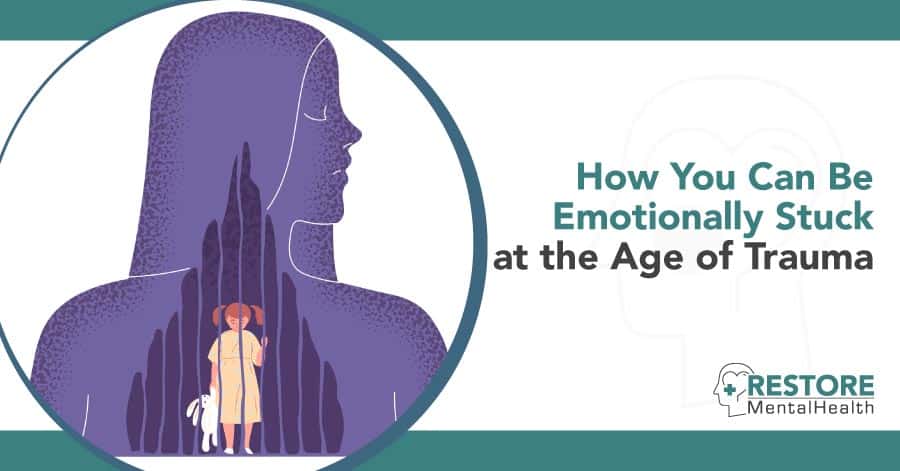Picture yourself at a social outing with your closest friends and acquaintances. In the company of those we’re comfortable with, we often let our defenses down, opening ourselves to playful banter and friendly ribbing.
However, in the midst of all the innocent fun, you feel one of their jabs cut a little too deep. Are your friends genuinely making fun of you?
When they look at you and start laughing, you get the feeling they’re laughing at you, not with you. Suddenly, you’re questioning whether they’re your friends at all, and you blow up at the slight brought against you. Now your well-meaning friends lose their genuine smiles. They think maybe they crossed a line. They’re hurt.
Being Emotionally Stunted
This unintentional display of anger is a sign you may be emotionally stunted. It’s estimated that 70% of adults in the U.S. suffer from this condition. If you have it, don’t worry — you’re not alone.
We’ll explore the complexities of emotional trauma in this article and how you can free yourself from arrested emotional development. But to combat trauma, we first need to understand how it originates.
How Trauma Works
Trauma is defined as an emotional response to a dangerous, unusual or life-threatening event. It may manifest as fear, anxiety, aggression or difficulty breathing.
An example of trauma is if you survive a car accident and are then unable to drive. You might sit in the driver’s seat, unable to so much as grasp the steering wheel because of a tightening sensation in your chest or tears blurring your vision.
This seemingly trivial action takes you back to the moment you almost lost your life, even if the accident was decades ago. Trauma freezes you at the age you experience it.
How Trauma Stunts Your Growth
Our brain is hardwired to keep us safe. When trauma sets in, our brain is essentially telling us to get away from the threat.
Trauma prevents you from growing and maturing. It also prevents you from facing your fears, taking bold risks, initiating relationships, forming valuable professional networks and chasing more lucrative careers.
It can prevent you from appropriately handling stressful situations by hindering your impulse control. These thought patterns can even lead to a higher incidence of violence and criminal behavior.
What Does Trauma Look Like?
People affected by trauma may have learned how to mask their symptoms, often subconsciously.
If you or someone you know behaves in the following ways, they may be emotionally stunted:
- Has difficulty forming close relationships
- Becomes angry at perceived slights
- Tends to apologize excessively
- Shuts down emotionally and locks others out
A common cause of these behaviors and mind sets is trauma sustained during childhood.
Childhood Trauma
Childhood trauma is a special kind of trauma and arguably more difficult to treat.
According to the International Society of Traumatic Stress Studies (ISTSS), childhood trauma may trigger what’s referred to as a heightened stress response that can hurt sleep patterns, affect the ability to regulate emotions and even cause a higher incidence of illness in adulthood.
If your child begins biting their fingernails while their brain is still developing, that habit has a better chance of continuing once their prefrontal cortex is fully developed in their mid-20s. Similarly, if you experienced bullying during your childhood, you may develop an apprehension of social interaction.
Why Do We Need to Treat Trauma?
If you allow trauma to govern your life, it can lead you to an even greater trauma: regret.
Suppose your buddy from high school notifies you of a class reunion happening next week. Out of habit, you decline because you don’t want to see the bullies who made your life difficult back in the day.
Years later, you bump into an old high school flame at the grocery store. As you two are catching up, this person mentions that they hoped to see you during the class reunion all those years ago — the same one you bailed on. Now they’re married and expecting a child.
You can’t help but wonder how your life might have been different if you’d attended the reunion.
Simply put, untreated trauma robs us of opportunities. It prevents us from moving on in life because we’re mentally trapped in the time period where the initial trauma occurred.
Trauma can prevent you from forming meaningful relationships and growing as a person. That’s why it’s imperative to address it and leave it in the past once and for all.
How to Treat Trauma
Trauma is a tough challenge to overcome. Make no mistake, it takes work, commitment and consistency.
But you shouldn’t experience a series of regrets, like the situation detailed above. You deserve a rich and fulfilling life and to be free of lingering pain and trauma. More importantly, you deserve to be happy.
Here are some ways to defeat the beast. Remember, consistency is key.
- Avoid taking drugs or alcohol — dopamine can be hard to resist, but you have to do it.
- Get involved in your community to take your mind off the trauma.
- Talk to someone you trust. The longer the trauma stays in your head, the more toxic it’ll get.
If no one is available, write down what’s bothering you in your personal journal. Never settle for excuses as to why you can’t overcome what’s been plaguing you.
Remember, this is your life. Take it back and take control.
Oftentimes, fighting trauma can prove mentally, physically and emotionally exhausting. Sometimes professional assistance is required.
Contact Restore Today
At Restore, we’ll provide a personalized assessment by our staff of highly educated and trained professionals. They’ll determine the best course of treatment, whether it should involve medications, therapy or a residency at one of our state-of-the-art facilities.
Our professionals understand the difficulties of navigating the higher stress responses you may suffer from.



